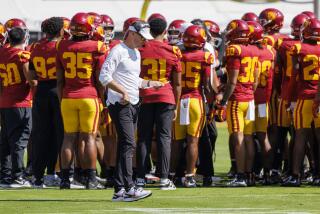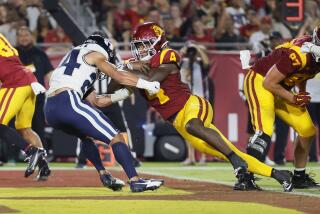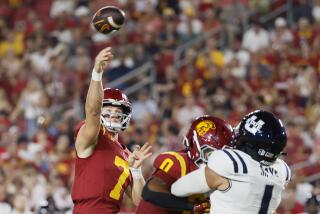The Times’ college football countdown: USC is No. 1
In June 2010, the NCAA hit USC with sanctions that included a two-year bowl ban and the loss of 30 scholarships. Two Junes later, one of the “Flying Wallendas” crossed Niagara Falls on a tightrope.
Two great balancing acts.
USC, metaphorically, is only halfway across Sanctions Gorge. The wind is still whipping the “Flying Kiffins,” but they can see the other side.
The fact USC football hasn’t toppled is remarkable.
The NCAA didn’t sideswipe USC with the idea the Trojans might win the national title three seasons later — but it could happen.
The NCAA hoped to make a case study of Reggie Bush and O.J. Mayo. “High-profile athletes demand high-profile compliance,” Paul Dee, chair of the infractions committee, intoned at the time.
The book the NCAA threw at USC — literally three feet thick — should have put the Trojans six feet under. And it still might.
“People think we’re through it,” USC Athletic Director Pat Haden said recently from his second-story office inside Heritage Hall. “We’re just starting. It is punitive. We haven’t seen the net result yet.”
But what if, in the miserable midst of it all, USC could pickpocket a national title?
The Trojans’ quest is one of this season’s most intriguing story lines. USC hasn’t earned a first down yet, but is in a very non-punitive poll position: The Trojans debuted at No. 3 in the USA Today coaches’ poll, No. 1 in the Associated Press media poll, and opens at No. 1 in the Times’ preseason poll.
We repeat: This was not the NCAA’s plan.
USC has managed the sanctions with uncanny deftness. It’s been like a Rube Goldberg experiment where one foul-up along the way ruins everything. Hard work, meticulous planning and a little luck have provided USC a glimmer at glamour.
The nonconference openers are Hawaii and Syracuse; later, USC plays Oregon and Notre Dame at home.
USC also could not have fathomed a year ago that a scandal at Penn State would aid the Trojans’ title cause.
USC Coach Lane Kiffin calls it “the perfect storm.”
Let’s chart the course:
USC hires Kiffin
Mike Garrett, in his last important act as athletic director, went outside the box in naming Kiffin to replace Pete Carroll. It was January 2010. Carroll, after a fairly spectacular run, left USC for the Seattle Seahawks.
With NCAA sanctions looming, Kiffin seemed an odd choice given that he was under NCAA investigation for alleged improprieties at Tennessee.
Garrett’s primary goal, with February signing day approaching, was saving a 2010 recruiting class that included receiver Robert Woods, linebackers Hayes Pullard and Dion Bailey and cornerback Nickell Robey.
Mission accomplished.
Kiffin had ties to USC as a former Carroll assistant and brought back Ed Orgeron, one of college football’s most relentless recruiters.
“They knew the institution,” Haden said. “They knew how to get the great players.”
USC hires Haden
In July 2010, a month after NCAA sanctions thundered down, USC President Max Nikias replaced Garrett with Haden.
In a word: brilliant. Haden was the antithesis of the defiant Garrett, who raged against the NCAA with his infamous screed to boosters, “They all wish they were Trojans!”
Haden made the department credible. He then hired former USC receiver J.K. McKay to monitor the football program. Haden and McKay have kept Kiffin’s loose lips in check (mostly) as they’ve watched a 37-year-old grow into his job.
Sanctions management
USC accepted the two-year bowl ban immediately, but appealed the scholarship losses of 10 per year for three seasons.
This deferral, along with enrolling key early signees, allowed USC to recruit a full class in 2011. Kiffin prophetically said at the time it was the most important recruiting class in the history of the program.
USC lost its NCAA appeal in May 2011 but had stockpiled enough quality players to stay the program course. The first wave of scholarship losses began this year.
“It allowed us to get our sea legs and give us some time to figure out how we were going to work our way through this,” Haden said.
Going 10-2 in 2011
This was crucial in proving to recruits USC football was not in decline. In fact, the Trojans closed with an emotional win at Oregon and a 50-0 rout of UCLA.
“Finishing so strong, I think that was very important to the program,” senior center Khaled Holmes said. “I think that’s why guys like Matt [Barkley] and T.J. [McDonald] stayed for their senior years with all that [NFL] money staring them in the face. It just speaks volumes about the character of leaders like them.”
Kiffin sold the momentum, door-to-door, to recruits.
“I think a lot of them said, ‘If they can do that without having anything to play for, what can we do if we go join them and do have something to play for?’” Kiffin said.
Barkley returns
USC would not be a preseason No. 1 had Barkley opted for the NFL draft. More than any person in the program, Barkley was responsible for keeping USC relevant during the bowl ban.
His 27-9 record as starting quarterback is not great by USC standards, but his legacy may transcend wins and losses.
“There was never a thought of leaving,” Barkley reiterated at Pac-12 media day. “Never any thought of doing anything other than standing up and facing the ‘giant’ in a sense.”
Penn State’s probation
In an uncanny twist, a team on major probation was able to take advantage of another team’s probation woes.
The conditions of Penn State’s probation allowed players to transfer to another major program without sitting out a season. USC, thin at the tailback position, was able to sign the Nittany Lions’ 1,000-yard rusher, Silas Redd.
Haden said this wasn’t a case of cherry-picking players.
“We didn’t just want Silas Redd, we needed Silas Redd,” Haden said. “There’s a difference between want and need.”
Haden credits Kiffin for tenaciously working to keep USC afloat.
“He’s very resourceful, very smart, very thoughtful, and he works his tail off,” Haden said.
USC, of course, isn’t even 1-0 yet. The program has two more years of reduced scholarships. Depth is a huge concern and the team will begin the season at least 10 players below the NCAA maximum of 85.
“It’s very fragile,” Haden said of the situation.
This title opening could close fast, but the Trojans have an unexpected opportunity.
The context of USC’s probation has also changed in the wake of more egregious acts at other schools, recasting the Trojans’ plight in a more sympathetic light.
“This isn’t the NCAA vs. USC,” Kiffin said. “USC put itself in that position by what happened, whether you agree with the ruling or not. It is what it is. They didn’t give penalties because absolutely nothing happened. . . . The NCAA made their decision and all we’ve ever done is try to maximize the situation.”
Defying odds is part of Kiffin’s mantra.
He enjoyed his apprenticeship role on Carroll’s championship squads. But those teams had stocked rosters. Doing more with less, riding the ragged edge, keeps Kiffin fully engaged.
“So if we can do this on a different playing field, there will be even more satisfaction,” he said. “Now, the story’s not over. We’ve got a lot of stuff to do.”
Chris Dufresne’s top 25 countdown: 25. Notre Dame; 24. Texas Christian; 23. Utah; 22. Kansas State; 21. Louisville; 20. Boise State; 19. Clemson; 18. Stanford; 17. Michigan State; 16. Oklahoma State; 15. Wisconsin; 14. Nebraska; 13. Arkansas; 12. West Virginia; 11. Florida State; 10. South Carolina; 9 . Ohio State; 8. Georgia; 7. Michigan; 6. Texas; 5. Oklahoma; 4. Louisiana State; 3. Oregon; 2. Alabama
More to Read
Go beyond the scoreboard
Get the latest on L.A.'s teams in the daily Sports Report newsletter.
You may occasionally receive promotional content from the Los Angeles Times.











